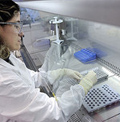 A special EU summit on November 23-24 will debate how much money Europe will devote to research, agriculture and structural funds for motorways and regional development in its 2014 to 2020 budget.
A special EU summit on November 23-24 will debate how much money Europe will devote to research, agriculture and structural funds for motorways and regional development in its 2014 to 2020 budget.
With several governments looking to reduce overall EU spending, the European Commission proposal for an €80 billion research funding pot is under fire.
The outcome of this week’s political wrangling could have an impact on health research, including immunology and vaccinology projects.
€60 million per year
For the past decade, the EU’s research budget has devoted an average of €60 million per year to vaccine research. These projects range from the search for vaccines for poverty-related diseases including HIV/AIDS, malaria and tuberculosis, to fighting emerging infectious epidemics and neglected diseases through basic and applied research projects.
Cross-cutting vaccine projects designed to improve vaccine production, batch testing and the development of adjuvants have also been supported.
In addition, the European Commission is offering a €2 million prize for novel ways transport vaccines which would help to deliver life-saving vaccination to people in remote areas.
The future
The European Commission’s plans for 2014 to 2020 makes specific mention of investing in vaccine research as a health promotion and disease prevention measure.
Funding to investigate more efficient production methods and clinical trials is also anticipated, along with support for training in vaccinology for health professionals and scientists.
Public-private partnership (PPP) involving the EU and vaccine companies is also likely to be discussed in more detail in the months ahead. It is thought that the Innovation Medicines Initiative – a €2 billion fund supporting the development of new medicines – could have a dedicated ‘pillar’ for cooperation in the vaccine sector.
All of this adds up to considerable long-term EU support for advances in vaccine science which promises to benefit Europeans as well as people in the world’s poorest countries. It also illustrates the kinds of programmes that could be at stake if political leaders fail to do a deal at the EU summit in Brussels this week.




